3 Performance Review Best Practices for Top Talent in a Growing Tech Startup
-1.png)


 Cut onboarding time
by 60%—here's the
Ultimate Checklist
that helped do it.
Cut onboarding time
by 60%—here's the
Ultimate Checklist
that helped do it.

The pandemic brought about a paradigm shift in workplace values and priorities and led to a mass exodus of workers across various industries.
This triggered a talent shortage, and companies soon struggled to fill key positions and train new hires as they needed to invest more time and resources in them. Many companies have chosen to hire freelancers to tackle initial pending projects, while others have made a complete transition to remote work.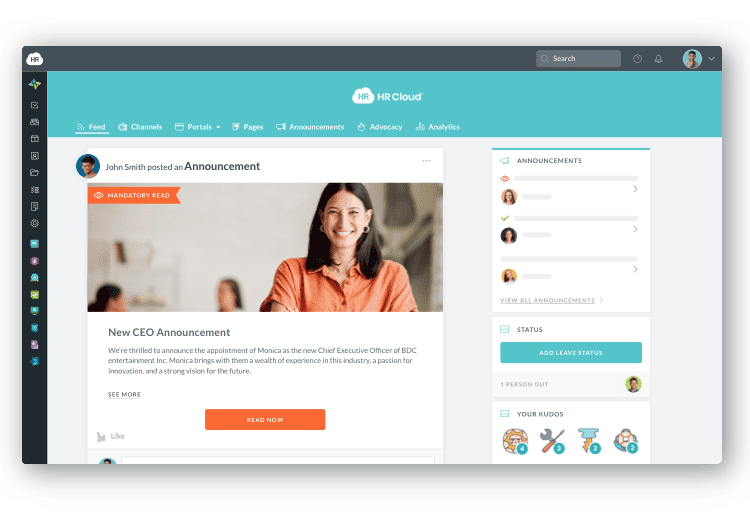
In 2022, employee turnover rates remained at an all-time high even after the pandemic's effects started wearing off. So, to stay competitive and thrive in 2023, startups must focus on retaining their best talent with the limited tools in their arsenal. This includes implementing effective performance evaluations and employee performance reviews to foster growth and engagement.
HR Cloud's performance management system offers a proactive approach to employee evaluation by providing ongoing tracking and management of performance, as opposed to traditional annual performance reviews. This empowers employees to take an active role in their performance plan while benefiting from faster and more constructive performance feedback.
Collaboration between employees and managers is made seamless through HR Cloud's performance management tools, which also foster recognition and reward initiatives. Additionally, the 360-degree feedback feature allows for a comprehensive and holistic review of employee performance, ensuring a thorough assessment. As surprising as it sounds, when done right, performance reviews cause employees to feel validated and stay longer at an organization.
This article explores some best practices managers must follow while conducting performance evaluations and why startups can no longer treat these reviews as a nice-to-have if they want to foster long-term growth and success.
3 Best Practices To Conduct Effective Performance Reviews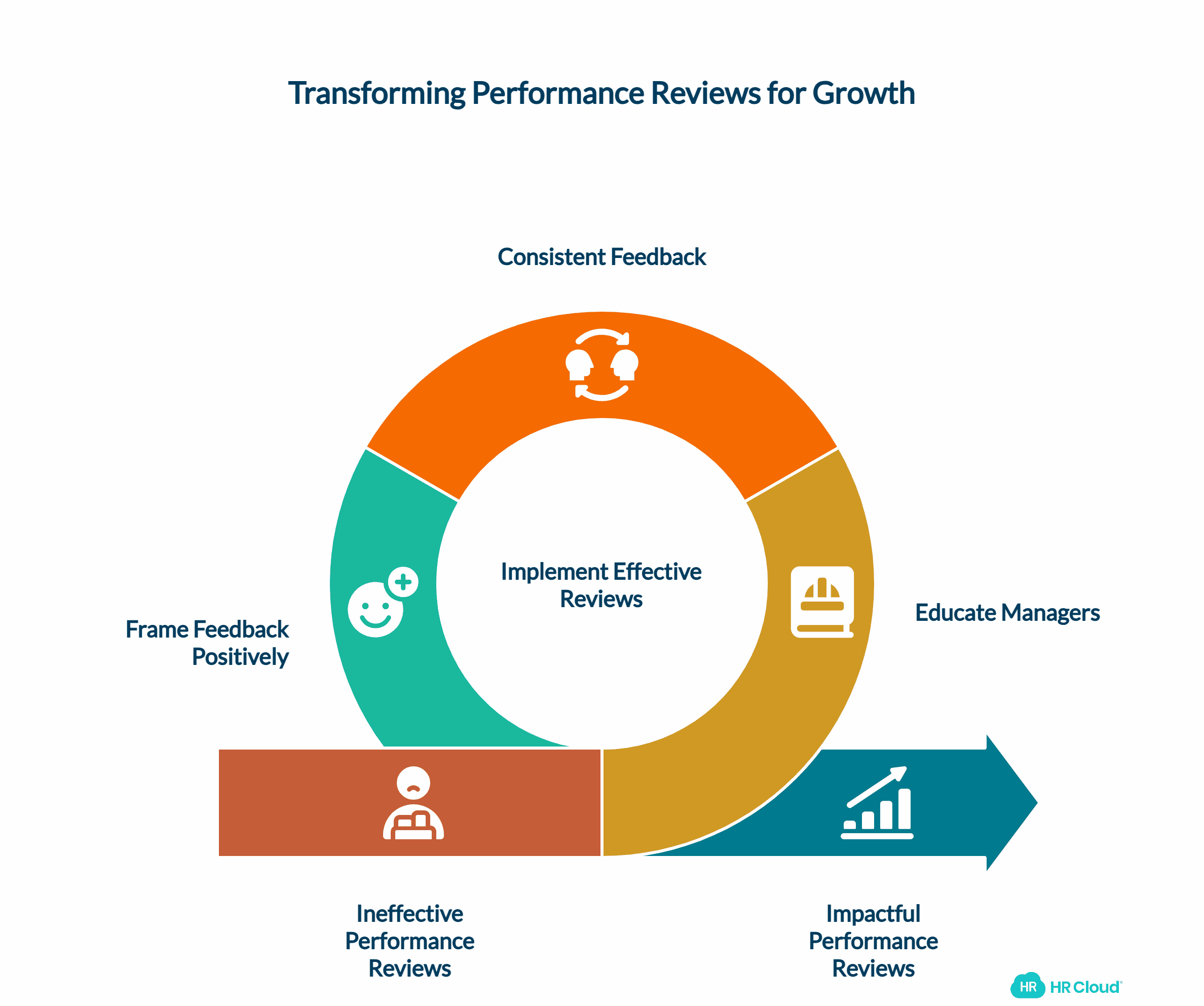
The term "performance review" often carries negative connotations; even top performers associate it with "harsh criticism" and "flaws" and view it as a chore they should endure. This is because many startups conduct one-sided reviews where managers assign scores and give surface-level feedback on where employees can improve without initiating a two-way conversation.
However, with a few simple changes, it is possible to transform these reviews into conversations that inspire productivity and growth in your top talent. Implementing an effective performance review process is crucial for employee development and overall organizational success.
Educate Your Managers
According to a McKinsey survey, performance evaluations don't help CEOs identify top performers, and more than half of employees think their managers don't get their reviews right.
Findings from a Gallup study are no better either—only one in five employees agreed that their company's review practices motivated them to do better.
In other words, performance reviews don't serve any purpose. And this happens because managers avoid difficult conversations due to the stress they bring. As a result, the review meetings become mere announcements of compensation revisions, and even top performers consider them pointless or unfair due to the lack of comprehensive feedback.
To transform these mediocre reviews into impactful ones that benefit your top talent and the top brass, you need to help your managers master conversations around critical feedback and compensation. Equipping your managers with relevant resources, such as curated content and performance review training, can help make the process easier. For instance, you can provide a simple template that helps your managers initiate meaningful performance conversations with top performers, indicating that the company is invested in their success and career development.
Give Consistent Feedback
A successful performance review should be an ongoing conversation between the employee and their manager, with the employee having a clear understanding of what will be discussed before the meeting.
And the best way to do that is through consistent feedback—managers should be upfront about what the employee did well and highlight what they could've done better after every task, and schedule regular 1:1 meetings to discuss progress. This approach aligns with modern performance management strategies that emphasize continuous feedback and real-time performance tracking.
This approach provides valuable performance data for managers to understand why an employee may fall behind in certain areas.
For example, a top performer may work hard but lack certain skills. Consistent evaluation and feedback enable the manager to determine the root cause and provide the right guidance and training for skill development.
Another benefit of offering consistent feedback is that it gives employees time to course correct and leads to improved performance over time without overwhelming them. This creates effective feedback loops that contribute to ongoing performance improvement and employee growth.
Frame Feedback with Positive Intent
Every employee, even your best ones, has room for improvement. While pointing out areas of improvement during review meetings is crucial for their growth, it's also important to ensure that they feel valued and appreciated.
So, managers need to offer constructive feedback and discuss the next steps in a way that boosts employee morale and motivates talent to make improvements to their work.
Milo Cruz, a marketing leader who has handled diverse teams in tech startups, recounts a situation in which constructive feedback helped one of the best performers in his organization move up the ladder.
“Six months ago, I handled a talented team member whose creativity was off the charts. In fact, most of his teammates looked up to him because he was self-sufficient and could still excel in his job, even without my supervision. However, collaboration is vital in our team, and he lacked the social skills to communicate effectively with his colleagues."
"During our performance review, I highlighted his achievements and how the management appreciated his innovative marketing ideas. But at the same time, I emphasized that while he can work independently, he needs to open up a bit to others and share his best practices within the team. I also let him understand how team effort could elevate his ideas and ultimately bring more success to the business."
"He is now one of the supervisors in the company and handles more than ten people. Though he was naturally introverted, he tried his best to socialize with other employees and got promoted four months after I had a one-on-one session with him," he says.
Milo's feedback helped the employee move forward in their career path for the following reasons:
-
Specificity: Milo highlighted his improvement's positive impact on the team and how it could translate to long-term success for the organization. This helped the employee understand why it's important for them to make the changes.
-
Balance: Milo didn't just point out the employee's shortcomings. He also appreciated their skills and pointed out how they are valuable to their company.
-
Respect: It's common for managers to see traits like introversion in a negative light. But instead of asking the employee to be more extroverted or making a comparison, Milo guided him towards opening up to his colleagues and managing them effectively.
While it's clear that startups should invest time in creating impactful performance reviews, most of them still don't prioritize them, given their limited time and resources. Plus, they don't realize the positive effect it will have on their organization in the long run.
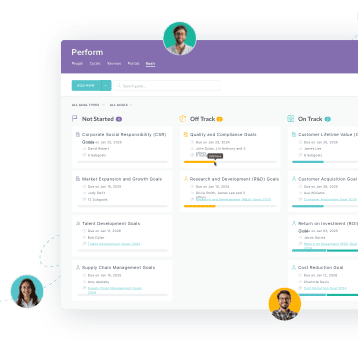
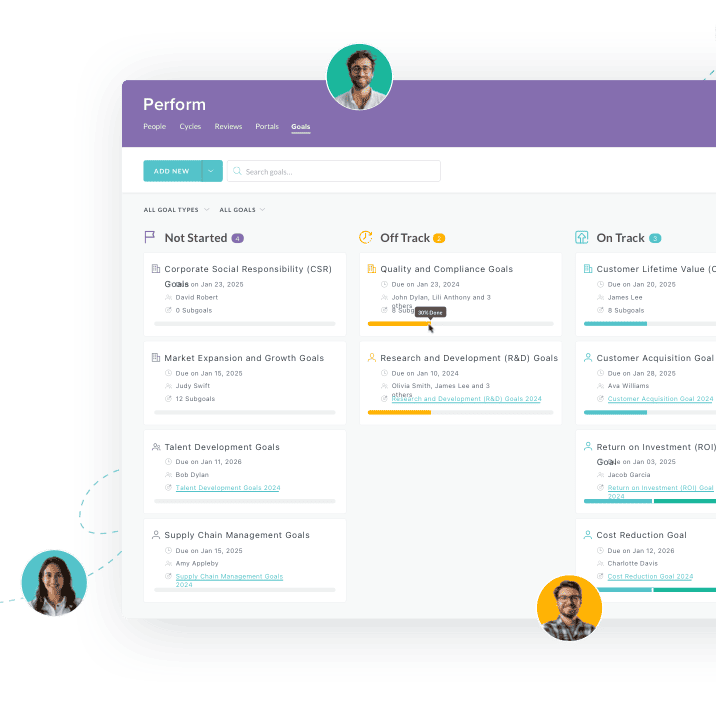
Why Startups Should Invest More Time In Performance Reviews
According to Farhan Virji, "Performance reviews shouldn't be an annual or bi-annual event. At Keyhole, we think about Performance as a culture, where people understand what's expected of them and how they can progress to the next stage of their career/role. Within a performance-based culture, managers should have ongoing performance discussions with their people by providing regular feedback."
One of the mistakes many startups make is not outlining the expectations of each role. Developing a scorecard that outlines these expectations for each role level is a good way for people to understand what's expected of them now and which areas they can focus on to develop their careers. This approach aligns with modern performance management strategies that emphasize clear performance goals and benchmarks.
Don't get hung up on the design of the scorecard. What's important is that there is a mutual understanding between the manager and the employee on what's expected of them, and what success looks like.
Furthermore, too often, people link performance reviews with compensation reviews and I think these should be decoupled. Performance is about regular and ongoing feedback to help people improve in areas they are not meeting expectations. If someone is not meeting expectations, why wait until a formal review? Tell them right away so they have time to adjust and improve. Compensation reviews should happen at specific intervals, and the performance of the individual should be input.
Most companies tend to treat performance reviews as an item they have to check off their to-do list. But talent trends and employee priorities are constantly changing, and great performance reviews indirectly contribute to long-term growth for two reasons:
Enables Managers to Learn What Employees Want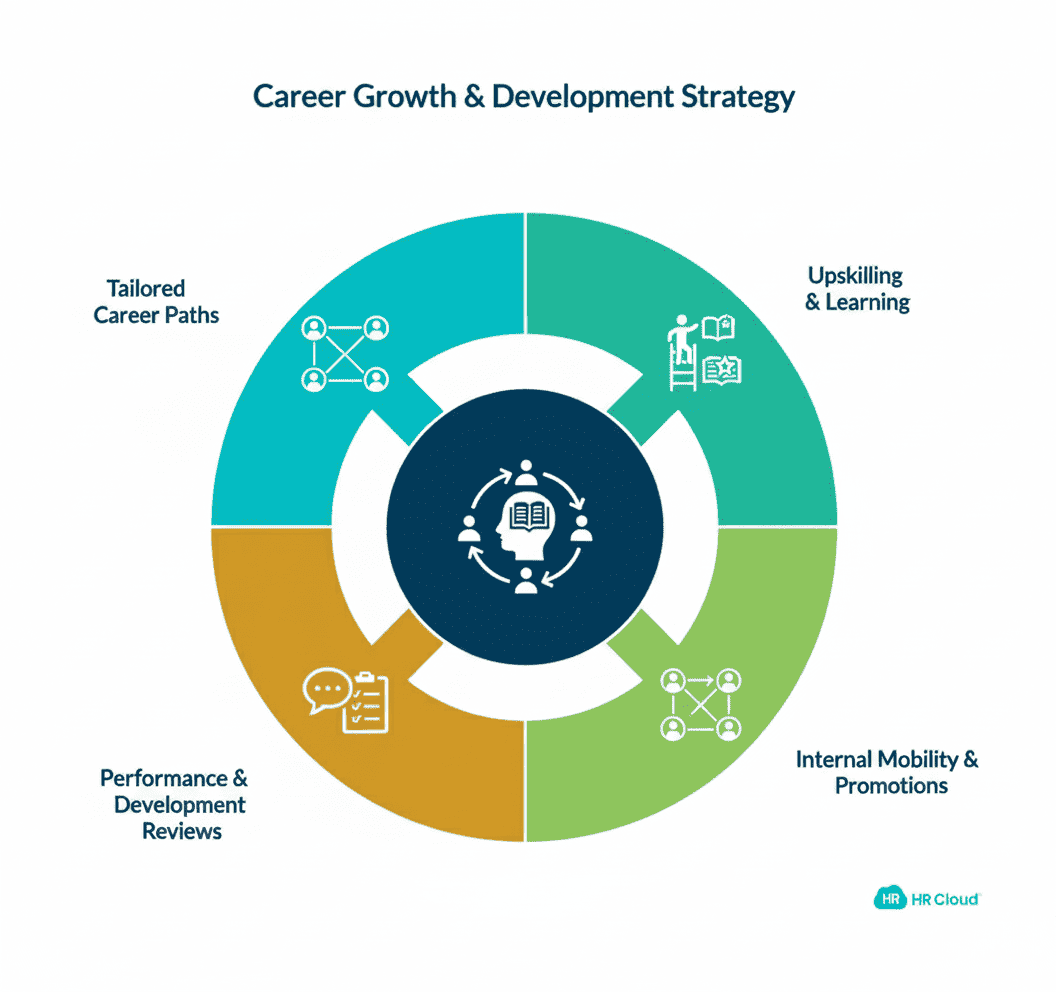
In the LinkedIn Global Talent Trends report published in 2022, employees cited upskilling themselves and learning new, highly desired skills as one of their top priorities apart from compensation and flexibility.
Plus, companies that offer employees opportunities to make internal moves through promotions or lateral changes have higher employee retention rates.
Conversely, companies that do not provide such opportunities have experienced a significant decrease in their retention rates over time.
Linda Jingfang Cai, LinkedIn's VP of Talent Development, explains the reason in the same report:
"Just as businesses need new skills, employees need to discover their career possibilities and change, too," she says.
"We know people want to learn and grow at work, regardless of economic and market conditions. This almost always translates to employees asking themselves and their managers, How can I do a better job so that I can get paid more, promoted, or land my next dream role?
Our new data insights show us that, even with some industry and regional nuances, if companies leave those questions unanswered, in most cases, people will leave the moment they find a better opportunity elsewhere," she adds.
This means you need to give your employees, especially top talent, more control over their career paths at your organization. And the best way to achieve this is to conduct regular performance reviews that incorporate career development discussions and skill development opportunities.
According to Sanjay Goel, "By asking questions about career goals, work preferences, and job satisfaction, managers can better understand their employees' needs and tailor their management approach accordingly. At NachoNacho, we believe that an open and honest dialogue during performance reviews is key to fostering a positive and productive work environment."
Performance reviews offer a valuable opportunity to engage 1:1 with your top talent and gain insight into their goals. They also serve as a means to assess their skills and pinpoint areas for development and growth. This information can help you provide additional resources, such as training and development programs, to support their professional development and improve your overall talent management strategy.
Improve Job Satisfaction
The best employees are, without doubt, the most hardworking and goal-oriented employees in an organization. But just because they're performing well and meeting targets on time, managers shouldn't make the mistake of assuming that they're satisfied in their workplace.
Top talent can also feel stressed and burnt out, and their performance might dip later if companies fail to meet their emotional needs. Consequently, productivity will plummet and the employee turnover rate will increase—the U.S. loses an estimated $550 billion every year due to unhappy employees. For an average company, this roughly translates to 18% lower productivity and 15% lower profitability, according to a recent Zippia report.
The most significant reason for declining job satisfaction rates among employees is not lower salaries. It's the lack of respect, meaning, and long working hours that they need to commit to. To determine the specific cause of employee discontentment, conducting company-wide surveys can be helpful. However, performance reviews provide a platform for two-way communication and enable managers to obtain valuable feedback from employees and make necessary changes to enhance job satisfaction and employee engagement.

Best Performance Review Example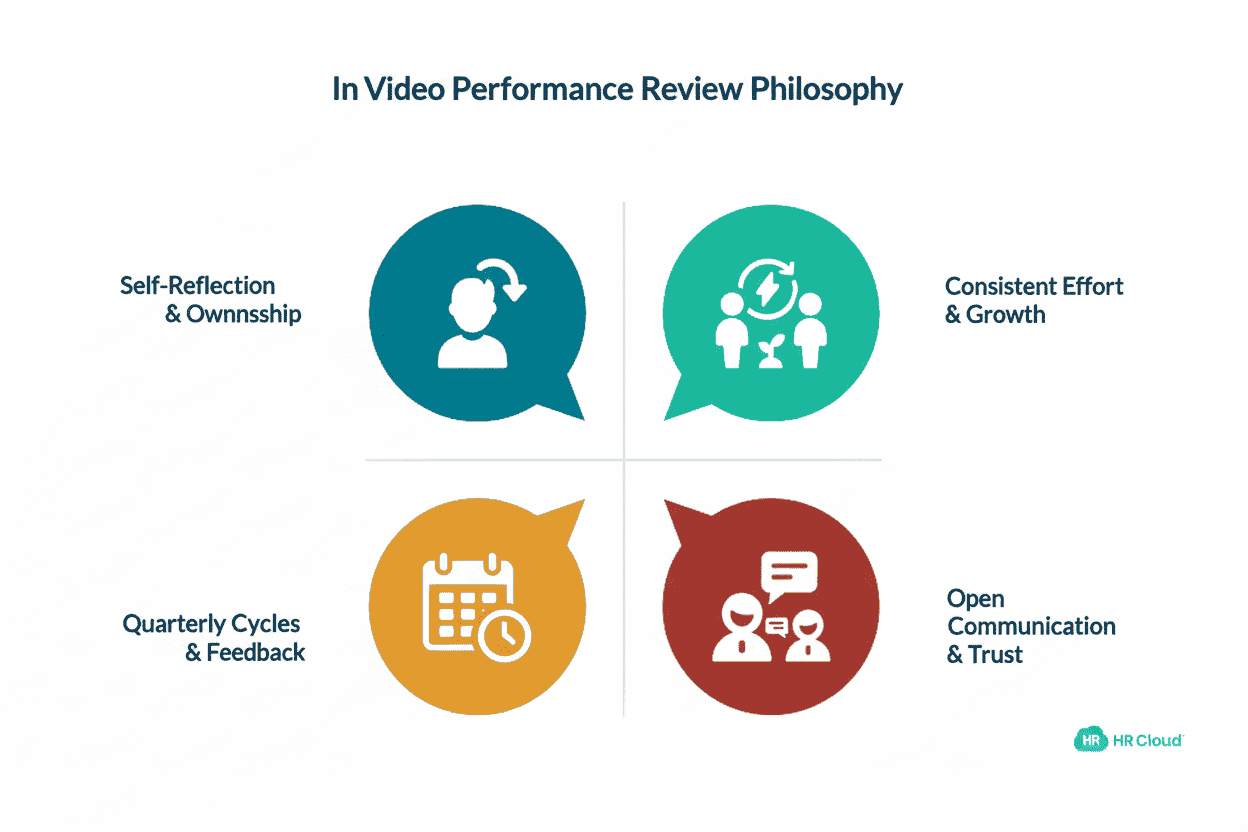
"The greatest results in life are usually attained by simple means and the exercise of ordinary qualities. These may for the most part be summed up in these two: common-sense and perseverance." - Owen Feltham
The self-evaluation process, or employee performance reviews, at InVideo, is
designed with an emphasis on the fact that consistent effort, along with practical and rational thinking, can lead to significant results in performance and personal growth. It goes beyond a one-way evaluation from managers to employees and encourages employees to reflect on their own performance and take ownership of their growth and development.
The review structure is designed for quarterly cycles, allowing for regular check-ins and feedback sessions. This frequent performance review cycle ensures that performance is regularly monitored, and any areas of improvement or achievements are acknowledged in a timely manner. It also creates a sense of urgency and accountability for employees to consistently perform at their best.
The self-evaluation process fosters a culture of open communication and trust within the organization. Employees are encouraged to provide feedback on their own performance and identify areas where they excel, and areas where they need improvement. This promotes self-awareness and self-reflection, allowing employees to recognize their strengths and weaknesses objectively.
Wrapping up
In today's competitive landscape, startups and larger organizations must focus on retaining their best talent. While employee recognition programs are an effective retention tool for MNCs, startups can make the most of performance reviews to improve employee engagement and reduce turnover rates.
To conduct effective performance reviews, managers must educate themselves, give consistent feedback, and frame feedback with positive intent. By following these best practices and implementing robust performance management processes, startups can transform performance reviews from one-sided conversations to meaningful dialogues that inspire productivity and growth in their top talent.
Author Bio:
Ancy Verghese has a strong background in people and culture and excels as a partner for bootstrapping engineering teams, especially during the early stages of a startup. Her passion for hiring the right candidate shines through in her attention to detail and dedication to ensuring a perfect fit for the team. She has a track record of success, having been involved in several successful exits including Arkin (now part of Vmware), Astro (now part of Slack India), Tegile systems (now part of Western Digital), Virtuata (now part of Cisco), and IO Turbine (now Fusion-IO). Overall, Ancy's expertise in people and culture makes her an asset in building and shaping a strong company culture and team dynamic.
Keep Reading
Best Onboarding Practices for Manufacturing Companies: 15 Proven Tactics That Boost Retention
"Three simple changes to our onboarding process cut our 30-day turnover from 28% to 12%.
Equity in the Workplace: A Practical Guide to Building Fairness and Opportunity
Workplace equity shouldn't be an aspiration—it should be the foundation of how
7 Employee Relations Responsibilities That Transform Workplace Culture
Employee relations shapes how people experience work every single day. It's not just
Like What You Hear?
We'd love to chat with you more about how HR Cloud® can support your business's HR needs. Book Your Free Demo

Build a Culture of Recognition. Boost Engagement. Guaranteed.
Workmates empowers employees to stay informed, connected, and appreciated—whether they’re on the front line, in the office, or remote. Recognition drives 12x higher engagement.Trusted by industry leaders in every sector




Cut Onboarding Costs by 60%.
Take the confusion and follow-ups out of onboarding with automated workflows, digital forms, and structured portals—so new hires ramp faster 3X quicker.Trusted by industry leaders in every sector




